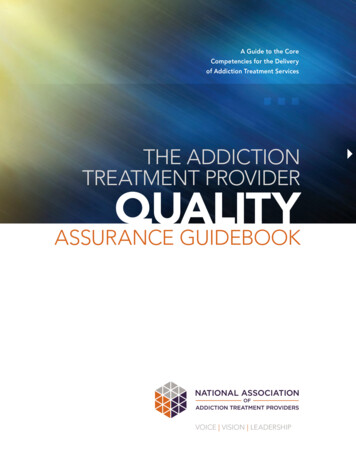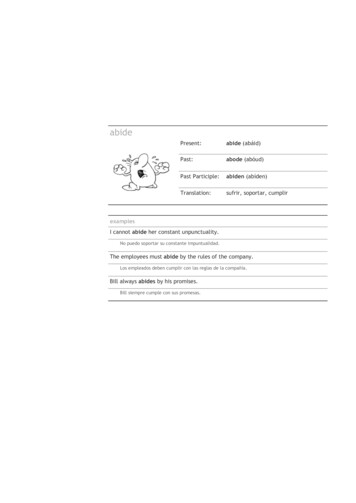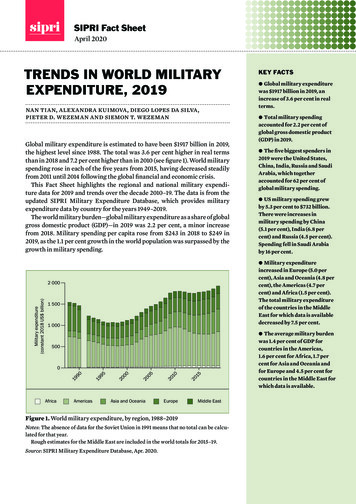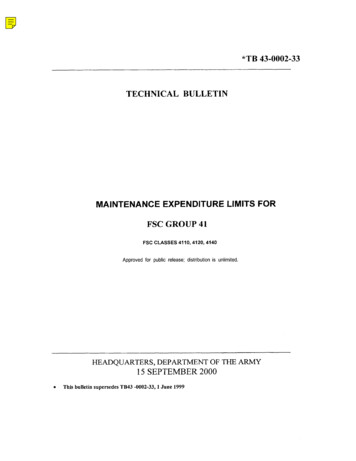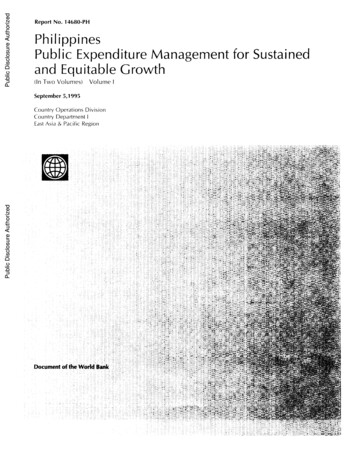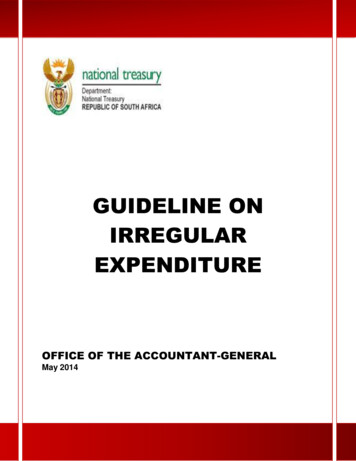
Transcription
GUIDELINE ON IRREGULAR EXPENDITUREGUIDELINE ONIRREGULAREXPENDITUREOFFICE OF THE ACCOUNTANT-GENERALMay 20141 Page
GUIDELINE ON IRREGULAR EXPENDITUREPURPOSE1.The purpose of this Guideline is to provide clarity on the procedures1 to be followedwhen dealing with the identification and application of irregular expenditure, defined insection 1 of the Public Finance Management Act (PFMA), 1999 as ‘expenditure otherthan unauthorised expenditure, incurred in contravention of or that is not in accordancewith a requirement of any applicable legislation, including –(a)(b)(c)2.this Act; orthe State Tender Board Act, 1968 (Act No. 86 of 1968), or any regulations madein terms of that Act; orany provincial legislation providing for procurement procedures in that provincialgovernment.This Act in section 1 of the PFMA includes any regulations and instructions issued interms of section 69, 76, 85 or 91.APPLICABILITY3.This Guideline applies to all departments, government components, trading entities,constitutional institutions and public entities listed in Schedule 2 and 3 to the PFMA.THE STATE TENDER BOARD ACT, 19684.The State Tender Board Act, 1968 (Act No. 86 of 1968) establishes the State TenderBoard and provides, among others, for regulating the procurement of goods andservices of national departments, for the disposal of movable property and the hiring orletting of anything. Provinces had similar legislation that established Provincial TenderBoards and which offered matters similar to those provided for in State Tender BoardAct, 1968.5.It must be noted that in section 1 of the PFMA, irregular expenditure is also deemed tohave occurred if there was contravention of the State Tender Board Act, 1968(Act No. 86 of 1968), or any regulations made in terms of that Act.6.In December 2003, the National Treasury issued a Supply Chain ManagementFramework in terms of section 76(4)(c) of the PFMA. This Framework was published inGovernment Gazette No. 25767 dated 5 December 2003 and took effect from the samedate.1This Guideline does not prescribe any new principle or procedure related to the identification and application ofirregular expenditure but is merely a consolidation of provisions that are currently contained in Practice Note 4 of2008/2009 on Irregular Expenditure.2 Page
GUIDELINE ON IRREGULAR EXPENDITURE7.In essence, the aforementioned Framework provides that accounting officers andaccounting authorities of Schedule 3A and 3C public entities must develop andimplement effective and efficient systems of supply chain management and to establishseparate supply chain management units reporting to their respective chief financialofficers.8.Prior to this Framework taking effect, all national and provincial departments arrangedfor the procurement of their goods and services in terms of legislation that establishedtheir respective Tender Boards.9.After this Framework took effect, all Provinces repealed legislation that established theirrespective Provincial Tender Boards and which also determined the manner in whichtheir supplies (goods) and services were procured.10.When the Supply Chain Management Framework took effect, it was recognized that theState Tender Board Act, 1968 (Act No. 86 of 1968) provided that national departmentswere only to procure their supplies for goods and services through the State TenderBoard. This in effect was in conflict with provisions of the Supply Chain ManagementFramework, which required departments to procure their goods and services eitherthrough the State Tender Board or in terms of the PFMA.11.On 5 December 2003, the Minister of Finance therefore published an amendment toregulations in terms of section 13 of the State Tender Board Act, 1968 (Act No. 86 of1968) which essentially allowed for accounting officers of national departments toprocure their goods and services either through the State Tender Board or by using theprovisions contained in the Supply Chain Management Framework.12.The amendment to the State Tender Board Act Regulations is consistent with the ethosof the PFMA which empowers accounting officers to manage but be held accountable forall expenditure incurred by their respective departments.13.Whilst the above amendment provides for a ‘dual system’ of procurement, the StateTender Board at the national level of government has since been disbanded and it is theintention to repeal the currently dormant State Tender Board Act, 1968 (Act No. 86 of1968) when amendments are effected to the PFMA.PRINCIPLES FOR IRREGULAR EXPENDITURE14.For a department or a government component 2 to incur irregular expenditure, thenon-compliance must be linked to a financial transaction. Although a transaction,condition or an event may trigger irregular expenditure, a department or governmentcomponent will only record irregular expenditure when a payment pertaining to the2This provision is applicable to those government components that are currently applying the modified cash basisof accounting and the Modified Cash Standard issued by the National Treasury.3 Page
GUIDELINE ON IRREGULAR EXPENDITUREnon-compliance is actually made (i.e. when the expenditure is recognized in accordancewith the recognition principles contained in the Modified Cash Standard). If ‘possibleirregular expenditure’ is determined prior to a payment being made, then such atransgression shall be regarded as a non-compliance matter until payment is made atwhich point irregular expenditure shall be recorded. Non-compliance corrected prior toany payment being made will not result in any irregular expenditure.15.A constitutional institution, trading entity or public entity listed in Schedules 2 and 3 tothe PFMA shall incur irregular expenditure when a transaction, condition or an eventlinked to the non-compliance is recognized as expenditure in the Statement of FinancialPerformance in accordance with the Standards of Generally Recognised AccountingPractice (GRAP), the Standards of Generally Accepted Accounting Practice (GAAP) orthe International Financial Reporting Standards (IFRS).16.The principle in paragraph 15 above shall also apply to government components that arerequired to comply with Standards of Generally Recognised Accounting Practice(GRAP), the Standards of Generally Accepted Accounting Practice (GAAP) or theInternational Financial Reporting Standards (IFRS).17.For the purposes of determining whether irregular expenditure has taken place, theremust have been a transgression of a provision contained in any applicable legislationwhich shall include:(a)(b)(c)(d)18.the PFMA;the Treasury Regulations;a National Treasury Instruction, issued in terms of section 76 of thePFMA; anda Provincial Treasury Instruction issued in terms of section 18(2)(a) ofthe PFMA.When applying the test to determine whether irregular expenditure has been incurred, itmust be clear that the contravention must relate to how the transaction, condition orevent was entered into and by whom as opposed to when the transaction, condition orevent was entered into. For example, non-compliance with the requirement to pay aninvoice within 30 days from its receipt (Treasury Regulation 8.2.3) shall not be regardedas irregular expenditure unless the expenditure itself was incurred in contravention ofrelevant legislation, such as an instance where the expenditure was authorized by anofficial who did not possess the appropriate delegated authority to approve theexpenditure in question.FINANCIAL MISCONDUCT19.Section 38(1)(c)(ii) of the PFMA requires an accounting officer to take effective andappropriate steps to, amongst others, prevent irregular expenditure. The correspondingprovision for public entities related to the prevention of irregular expenditure is containedin section 51(1)(b)(ii) of the PFMA.4 Page
GUIDELINE ON IRREGULAR EXPENDITURE20.In terms of section 81(1)(b) and 83(1)(b) of the PFMA, an accounting officer andaccounting authority shall commit an act of financial misconduct if that accounting officeror accounting authority makes or permits irregular expenditure.21.Similarly, officials serving in the institutions referred to in paragraph 3 above shallcommit an act of financial misconduct if he or she fails to take effect and appropriatesteps to prevent irregular expenditure within that official’s area of responsibility.22.In terms of sections 38(1)(h)(iii) and 51(1)(e)(iii) of the PFMA, the accounting officer orauthority must take effective and appropriate disciplinary steps against any official in theservice of their respective establishments who makes or permits irregular expenditure.23.Treasury Regulation 4.1.3 provides that, if an accounting officer is alleged to havecommitted financial misconduct, the relevant treasury, as soon as it becomes aware ofthe alleged misconduct, must ensure that the relevant executive authority initiates aninvestigation into the matter and if the allegations are confirmed, holds a disciplinaryhearing in accordance with the prescripts applicable and agreements applicable in thepublic service.UNAUTHORISED EXPENDITURE3 VERSUS IRREGULAR EXPENDITURE24.If a department incurs expenditure that contravenes any applicable legislation, thisexpenditure meets the definition of irregular expenditure and must be classified as such.25.Should the irregular expenditure in paragraph 24 relate to the procurement of goods orservices that are not in accordance with the purpose of the main division/vote or whichresults in the overspending of the main division/vote, such expenditure also meets thedefinition of unauthorised expenditure.26.Transactions such as those in paragraphs 24 and 25 above may not be accounted for asboth irregular expenditure and unauthorised expenditure. Considering that irregularexpenditure is defined as expenditure other than unauthorised expenditure, this meansthat unauthorised expenditure shall take precedence over irregular expenditure.ACCOUNTING POLICY FOR IRREGULAR EXPENDITURE27.3The following is the recommended accounting policy for irregular expenditure:When confirmed, irregular expenditure must be recorded in the notes to the financialstatements. The amount to be recorded in the notes must be equal to the value of theirregular expenditure incurred unless it is impracticable4 to determine the value thereof.Unauthorised expenditure is a concept that is only applicable to departments.Impractical means, “Applying a requirement which is impracticable when a department, government component,trading entity, constitutional institution or a public entity cannot apply it after making every reasonable effort to doso.”45 Page
GUIDELINE ON IRREGULAR EXPENDITUREWhere such impracticality exists, the reasons therefore must be provided in the notes.Irregular expenditure must be removed from the notes when it is either (a) condoned bythe National Treasury or the relevant authority; (b) it is transferred to receivables forrecovery; or (c) it is not condoned and is irrecoverable. A receivable related to irregularexpenditure is measured at the amount that is expected to be recovered and must bede-recognised when the receivable is settled or subsequently written off asirrecoverable.IRREGULAR EXPENDITURE THAT DOES NOT RESULT IN A LOSS28.Whilst irregular expenditure is incurred as a result of transactions, conditions or eventswhere there have been legislative transgressions, there are, however, instances wheresuch transactions, conditions or events have not resulted in an institution suffering a lossand where value for money was derived from the use of the goods procured or servicesrendered.29.If the National Treasury or the relevant authority does not condone the irregularexpenditure in paragraph 28 above and it is confirmed that there is no person liable inlaw for the irregular expenditure, the accounting officer or accounting authority may writeoff the irregular expenditure as irrecoverable.PROCEDURES FOR THE TREATMENT OF IRREGULAR EXPENDITURE30.Procedures for the discovery, investigation and reporting of irregular expenditure(a)Any employee who becomes aware of or suspects the occurrence of irregularexpenditure must immediately, in writing, report such expenditure to theaccounting officer or accounting authority.(b)On discovery of alleged irregular expenditure, such expenditure must be left inthe expense account and the accounting officer or accounting authority mustrecord the details of the expenditure in an irregular expenditure register.(c)The accounting officer or accounting authority or his/her delegate must decide onthe level of enquiry/investigation to be undertaken to determine whether theexpenditure in question is irregular expenditure or not. During the period ofenquiry/investigation, the expenditure must remain in the expense account. Theresults of the enquiry/investigation will determine the appropriate action to betaken regarding the transgression.(d)Should the investigation reveal that the expenditure does not constitute irregularexpenditure, the details of the expenditure should be retained in the register forthe purposes of completeness (and to provide an appropriate audit trail). Theregister must then be updated to reflect the outcome of the investigation.6 Page
GUIDELINE ON IRREGULAR EXPENDITURE(e)31.32.Procedures for raising a receivable and the recovery of irregular expenditure(a)Receivables comprise of amounts due to the state as a result of the sales ofgoods, the provision of services or the recovery of expenditure incurred by thestate. If an investigation into alleged irregular expenditure confirms that suchexpenditure has in fact been incurred, a receivable (debtor) for the recovery ofthe relevant amount must be raised.(b)The accounting officer or accounting authority must in terms of section 38(1)(c)(i)and 51(1)(b)(i) of the PFMA, take effective and appropriate steps to collect allmoney due to the institution, hence every effort must be undertaken to recoverirregular expenditure.(c)The accounting officer or accounting authority must determine who theresponsible party is from whom the amount should be recovered. Thisinformation would normally become evident while performing the investigation.(d)The accounting officer or accounting authority must in writing request that theresponsible person pay the amount within 30 days or in reasonable installments.If the official fails to comply with the request, the matter may be handed to theState Attorney or an internal appointed attorney (in the case of departments) orappointed attorneys (in the case of constitutional institutions and public entities)for the recovery of the debt.(e)In terms of Treasury Regulation 9.1.4, the recovery of losses or damagesresulting from irregular expenditure must be dealt with in accordance withTreasury Regulations 12 dealing with management of losses.(f)If the amount of the irregular expenditure is irrecoverable from a person who isliable in law5, the accounting officer may write off the debt in terms of TreasuryRegulation 11.4. The accounting authority may perform similar in terms of thepublic entity’s debt write off policy.Procedures for the condonation of irregular expenditure(a)5If the investigation indicates that the expenditure is in fact irregular expenditure,the accounting officer must immediately report, in writing, in terms of section38(1)(g) of the PFMA the particulars of the expenditure to the relevant treasury.In the case of departments, the irregular expenditure must also be included in themonthly report on revenue and expenditure as submitted by the accountingofficer to the relevant treasury, in terms of section 40(4)(b) of the PFMA.As part of the enclosed procedures, provision is made for accounting officers andaccounting authorities to forward submissions to the National Treasury or theA person who is liable in law means” a legal responsibility of a person's acts or omissions7 Page
GUIDELINE ON IRREGULAR EXPENDITURErelevant authority to request condonation for non-compliance with the PFMA orother legislation respectively. The treasury to which the submission must beforwarded will depend on the provision that was contravened. It must, however,be emphasised that submissions requesting condonation for non-compliancemust contain the detailed motivation as to why the irregular expenditure in question shouldbe considered for condonation;details of the transgression;reference to relevant legislation;reason(s) for deviating from the required legislation or prescripts;whether the state suffered any loss due to the transgression;in the case of supply chain management transgressions providereasonableness of price(s) determined in a case where only one pricewas sourced from one bidder;financial implications for such a transgression;in the case of a supply chain management transgression providecontractor(s) who were involved;corrective steps taken to prevent any recurrence; andthe relevant supporting documentation.(b)If the irregular expenditure is subsequently condoned by the National Treasury orthe relevant authority, no further action is required by the department,government component, constitutional institution, trading entity of a public entityas the amount has already been expensed in the statement of financialperformance. The register must be updated to reflect that the irregularexpenditure was condoned and the notes to the annual financial statements mustalso be updated to reflect the condoned irregular expenditure.(c)In instances where condonation for irregular expenditure is not granted by theNational Treasury or the relevant authority, immediate steps must be taken torecover such expenditure from the relevant person, if he/she is liable in law.(d)If there is doubt regarding liability in law referred to in (c) above, the accountingofficer of a department must consult the internal appointed attorney or StateAttorney. Constitutional institutions and public entities must at least consult theirin house legal services in this regard.33.The enclosed Annexure A illustrates procedures for the treatment of irregularexpenditure by departments, trading entities, government components and constitutionalinstitutions whilst Annexure B illustrates procedures to be followed by public entities.34.Irregular expenditure not condoned must be accounted for in accordance with therelevant accounting standards.8 Page
GUIDELINE ON IRREGULAR EXPENDITURERELEVANT AUTHORITY35.For purposes of condoning irregular expenditure, the relevant authority is “the person orinstitution whose approval would have been required prior to entering into thattransaction or incurring such expenditure or the institution responsible for the relevantlegislation”.36.Where the accounting authority of a public entity consists of a board, such authority maydelegate the power to condone irregular expenditure to the next lower level of authoritywithin the public entity, for example, Chief Executive Officer.DELEGATIONS OF AUTHORITY37.Expenditure resulting from non-adherence to an institution’s delegations of authority isalso regarded as irregular expenditure since such delegations are issued in terms ofsections 44 and 56 of the PFMA for departments/constitutional institutions/tradingentities and public entities respectively.EXAMPLES OF IRREGULAR EXPENDITURE38.The enclosed Annexure C provides a list of possible transgressions, the impact thereof(whether it results in irregular expenditure or non-compliance with laws and regulations)and the relevant authority for condonement in each particular instance. This annexureonly provides possible transgressions and the list contained therein is not exhaustive.39.The following table provides examples of irregular expenditure and the relevant authoritythat is empowered to condone such expenditure:Categories of irregular expenditureRelevant AuthorityIrregular expenditure incurred as a result of noncompliance with a Treasury Regulation where prior writtenapproval was required from a relevant treasury. Forexample, a department, trading entity, constitutionalinstitution or public entity that incurred expenditure relatedto a public private partnership without obtaining the priorwritten approval of the relevant treasury, as requiredby Treasury Regulation 16.4.2.The National Treasury, in thecase of national ions and national publicentitiesandtherelevantprovincial treasury in the case ofprovincialdepartmentsorprovincial public entities.Irregular expenditure incurred as a result of noncompliance with a Treasury Regulation which requiredcognisance to be taken of a National Treasurydetermination. For example, a department, trading entity,constitutional institution or public entity procured goods orservices by means of price quotations where the value ofThe National Treasury, in casesof all departments, trading entities,constitutionalinstitutionsandpublic entities.9 Page
GUIDELINE ON IRREGULAR EXPENDITURECategories of irregular expenditureRelevant Authoritythe purchase exceeded the threshold values determinedby the National Treasury for price quotations.(Contravention of Treasury Regulation 16A6.1)Irregular expenditure incurred as a result of institutionsprocuring goods or services by means other than throughcompetitive bids and where reasons for deviating frominviting competitive bids have not been recorded andapproved by the functionary to whom the power has beendelegated by the accounting officer or accountingauthority. (Contravention of Treasury Regulation 16A6.4)The Accounting Officer. in casesof all departments, trading entitiesand constitutional institutions andin the case of public entities, theAccounting Authority.Irregular expenditure incurred as a result of noncompliance with a requirement of the institution’sdelegations of authority issued in terms of the PFMA. Forexample: An official approves purchase of goods to thevalue of R35 000 however his limit in terms of delegationof authority is R30 000.The Accounting Officer, in cases ofall departments, trading entities orconstitutional institutions and in thecase of public entities, theAccounting Authority.Irregular expenditure incurred as a result of noncompliance with a provision contained in any applicablelegislation. For example, a department grantsperformance rewards to personnel without maintainingand implementing a Performance Management andDevelopment System, as required by Part VIII B of thePublic Service Regulations).The Dept responsible for thelegislation concerned and in thecase of this example, the Dept ofPublic Service and Administration.40.From the above it is clear that in certain instances, accounting officers and accountingauthorities have the power to condone irregular expenditure that was incurred as a resultof transgressions by their respective officials.41.If, however, the accounting officer or accounting authority is responsible for thetransgression, only the National Treasury or the relevant treasury (whichever isapplicable) may condone such a transgression.IRREGULAR EXPENDITURE REGISTER42.Accounting officers and accounting authorities must maintain an irregular expenditureregister which must contain a detailed schedule for each financial year listing all irregularexpenditure incurred by their respective institutions. An example of an irregularexpenditure register is contained in the enclosed Annexure D.43.Prior to institutions recording expenditure as irregular, a process must be instituted toensure that the expenditure in question falls within the definition of irregular expenditure,as provided in section 1 of the PFMA.10 P a g e
GUIDELINE ON IRREGULAR EXPENDITURE44.If in doubt, accounting officers and accounting authorities must consult the relevanttreasury for guidance on interpretation of the definition of irregular expenditure.45.The irregular expenditure register must be kept up to date in order to track all allegedand confirmed irregular expenditure and for the purposes of maintaining an audit trail.This will also assist in ensuring that the irregular expenditure in the annual financialstatements is complete and accurate.RECORDING IN THE IRREGULAR EXPENDITURE REGISTER AND IN THE ANNUALFINANCIAL STATEMENTS46.On discovering possible irregular expenditure, the accounting officer or accountingauthority must ensure the recording of such details in the irregular expenditure register.47.If the irregular expenditure is confirmed, the register must be updated with the necessaryconfirmation that the expenditure in question is in fact irregular expenditure. Theseamounts must be included in the notes to the annual financial statements.48.If the investigation reveals that the expenditure is not irregular expenditure, the registermust be updated accordingly. Records of all the follow-up activities that take place oncethe alleged irregular expenditure is discovered must be maintained and referenced in therelevant register.49.Accounting officers and accounting authorities are encouraged to conclude allinvestigations and resolve all matters related to irregular expenditure within 90 days fromthe date on which the alleged irregular expenditure was discovered or as soon aspractically possible. If such investigations are not concluded by the date on which theannual financial statements are published, a narrative to this effect must be included partof the irregular expenditure note to the annual financial statements.50.The accounting officer or accounting authority must ensure that the validity of irregularexpenditure is confirmed before the annual financial statements are submitted for auditpurposes. If irregular expenditure occurred during the year under review and is onlydiscovered during the audit, the validity thereof must be confirmed before the audit isfinalised. If an investigation is still in progress after the audit is completed then anarrative to this effect should be included in the irregular expenditure note in the annualfinancial statements.51.Treasury Regulations 9.1.5 and 28.2.1 require accounting officers and accountingauthorities to disclose all irregular expenditure incurred by their respectiveestablishments as a note to their annual financial statements which must includeparticulars of amounts condoned by the National Treasury or relevant authority in thesame financial year and/or before finalisation of financial statements.11 P a g e
GUIDELINE ON IRREGULAR EXPENDITURE52.The disclosure of irregular expenditure incurred is a legal requirement rather than anaccounting requirement. It is the act that results in irregular expenditure that is ofimportance to the user of the financial statements. The amount does not add to itssignificance and focusing on the quantification of irregular expenditure, while it isimportant, may divert attention away from the act itself. The primary focus from anoversight perspective is ensuring that spending agencies abide by the law in executingtheir mandates.53.The Modified Cash Standard provides for the annual financial statements disclosurerequirements for departments and government components operating on a modifiedcash basis of accounting. The annual financial statements template must be used tocomplement the Modified Cash Standard and provide for a format in which thedisclosure requirements of irregular expenditure must be presented in the annualfinancial statements and related notes. The annual financial statements template mustbe used for disclosure requirements of irregular expenditure for government componentsoperating on an accrual basis of accounting, trading entities, constitutional institutionsand public entities.54.Irregular expenditure that was incurred and identified during the current financial yearand which was condoned before year end and/or before finalisation of the financialstatements must also be recorded appropriately in the irregular expenditure register. Insuch an instance, no further action is required with the exception of updating the note tothe financial statements.55.It is acknowledged that there may be instances where the irregular expenditure arosefrom fraudulent, corrupt and criminal activities or through actions that deprived the stateof value for money and may result in the state instituting a civil claim against a thirdparty. In such cases the institution would have to evaluate the impact of the infractionand the likelihood of someone being liable in law. The extent of the liability would thushave to be established. If the total amount could not be established by the date ofapproval for issue of the annual financial statements, the sub-notes must disclose thisfact along with the reasons why.56.In instances other than the above, the accounting officer or accounting authority mustquantify the total amount of irregular expenditure unless it is impractical to do so. Whenthe institution can demonstrate that it is impractical to quantify the full amount, it shoulddisclose this fact along with the reasons why.57.In summary, the disclosure requirements with regard to the identification andquantification of irregular expenditure are as follows:12 P a g e
GUIDELINE ON IRREGULAR EXPENDITURETransgression took place inthe current financial yearTransgression took place in aprevious financial yearSuspected irregular expenditureidentified and in process ofinvestigation to confirmNo disclosure in theirregular expenditure noteNo disclosure in theirregular expenditure noteAlleged irregularity confirmed asirregular expenditure and furtherinvestigated to determine thenature, extent and root cause ofthe transgression (where forexample the department is in theprocess of establishing whetherthis is isolated).Disclose amount of irregularexpenditure confirmed and notethat further instances (theextent) of this type of irregularexpenditure are underinvestigation.Disclose amount of irregularexpenditure confirmed and notethat further instances (theextent) of this type of irregularexpenditure are under
the National Treasury or the relevant authority; (b) it is transferred to receivables for recovery; or (c) it is not condoned and is irrecoverable. A receivable related to irregular expenditure is measured at the amount that is expected to be recovered and must be de-recognised when the receivable is settled or subsequently written off as

